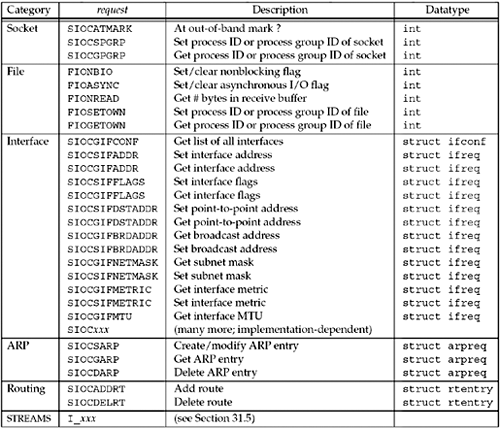17.2 ioctl Function
This function affects an open file referenced by
the fd argument.
|
#include <unistd.h>
|
|
int ioctl(int fd, int request, ... /* void *arg */ );
|
|
Returns:0 if OK, -1 on error
|
The third argument is always a pointer, but the
type of pointer depends on the request.
4.4BSD defines the second argument to be an
unsigned long instead of an int, but that is not
a problem since header files define the constants that are used for
this argument. As long as the prototype is in scope (i.e., the
program using ioctl has included
<unistd.h>), the correct type for the system will be
used.
Some implementations specify the third argument
as a void * pointer instead of the ANSI C ellipsis
notation.
There is no standard for the header to include
to define the function prototype for ioctl since it is not
standardized by POSIX. Many systems define it in
<unistd.h>, as we show, but traditional BSD systems
define it in <sys/ioctl.h>.
We can divide the requests related to networking into six
categories:
Recall from Figure 7.20 that not
only do some of the ioctl operations overlap some of the
fcntl operations (e.g., setting a socket to nonblocking),
but there are also some operations that can be specified more than
one way using ioctl (e.g., setting the process group
ownership of a socket).
Figure
17.1 lists the requests, along
with the datatype of what the arg
address must point to. The following sections describe these
requests in more detail.


|